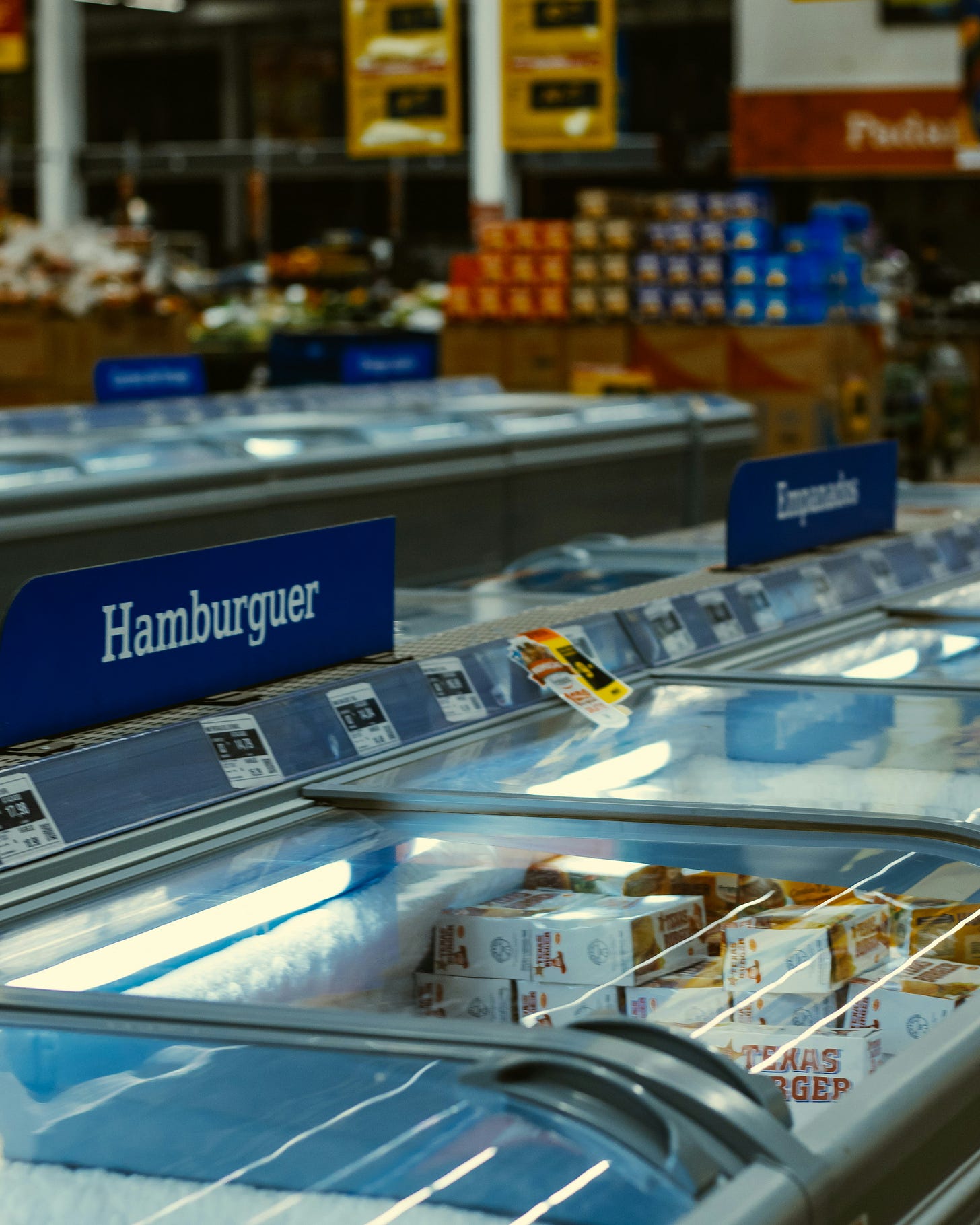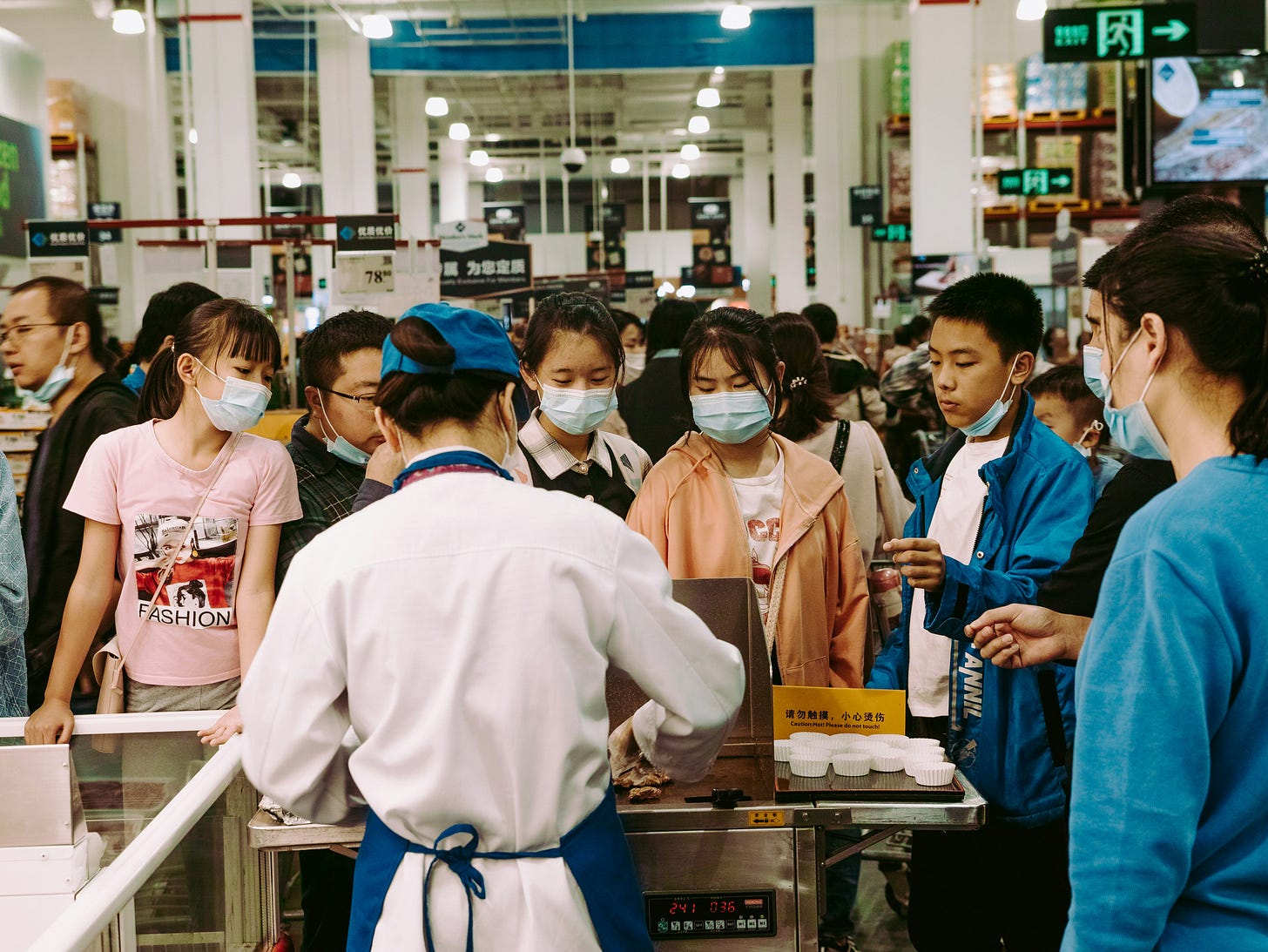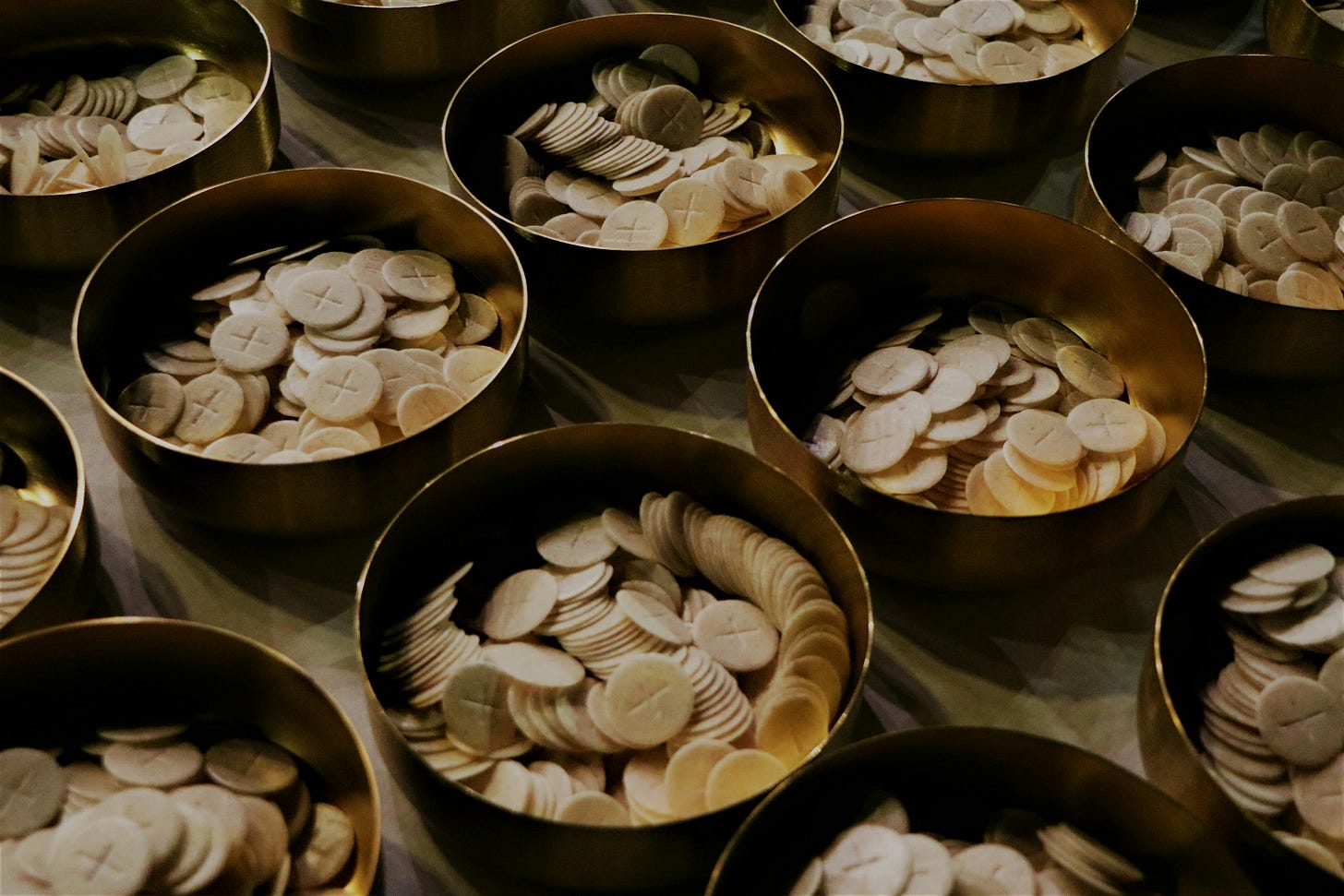A person will worship something—have no doubt about that. We may think our tribute is paid in secret in the dark recesses of our hearts—but it will come out. That which dominates our imaginations and our thoughts will determine our lives, and our character. Therefore, it behooves us to be careful what we worship, for what we are worshipping we are becoming.
- Attributed to Ralph Waldo Emerson
In the cell that I have lived in my whole life, food has been taken for granted. This has always struck me as at least a little weird, and that sense has only gotten stronger as time has gone on. This essay was difficult to write because of the manifold ways in which food is weird. But despite the challenge of it, there are few topics worth discussing more.
All my life, I have not once been uncertain about if I will be able to procure food. I have always been confident that my next meal will be available when it’s needed. I wouldn’t be surprised if I had missed some of the economic worries my parents had when I was younger; I remember times when they had been laid off, and the stress during the 2008 recession in particular. But if my parents had anxieties about putting food on the table, they took pains to ensure that those anxieties never reached me, and in the end they always managed to get dinner on the table. I never missed a meal out of a lack of access to food. Most of my peers have been in the same boat. This is weird.
There are a few things that have universally tormented humans until some point within the last 200 years. Perhaps the most foundational one, according to the model of early human society that I am familiar with, is reliable access to safe and nutritious food. A long while back, nomadic groups of humans began to figure out agriculture. This gave them access to a more reliable source of food. With agriculture came settlements, cities, and more stable ways of life. Even then, the food supply was uncertain. One year could be plentiful and the next bring famine. It wasn’t until recent times that large groups of humans began to have generally reliable sources of reasonably nutritious food. In the 19th century United States, before the introduction of the Food and Drug Administration, the growth of industrial chemistry provided very unscrupulous individuals the ability to fill food with heavy metals and formaldehyde. This made it look and taste fresher, but also toxic. Additionally, there was little regulation of food fraud; people would buy something marketed as honey, but really it was corn syrup. The introduction of the FDA saw huge progress on making the United States food supply safer. A bit later, in the 20th century, the world began to benefit from the cold chain, the ability to keep food refrigerated or frozen from the beginning of processing to the time it reaches the consumer. This allowed produce to stay edible while being transported across long distances and stalled the growth of foodborne pathogens. These are very recent developments that have revolutionized our food supply. The experience of many people in the United States and other highly wealthy countries today, where access to reasonably safe and nutritious food is common, is a complete outlier in history. The ability to walk into a supermarket and purchase fresh, safe produce for an amount equal to a couple minutes of labor is a modern miracle.

This is not even considering the bizarre nature of processed foods. Today I can walk to a Trader Joe’s and purchase, at a cost equivalent to about 30 minutes of my labor, a frozen meal. This meal was prepared using industrial methods, methods that appear utterly alien to most people, and then kept frozen the entire way until I had it in my hands. I can store it in the freezer that I have at home, which was originally popularized less than a century ago. Once I’m ready to eat it, all I have to do is put it in my microwave—itself widely available only about half a century ago—and press a few buttons to heat it up. There are people alive today in the United States who remember when this wasn’t possible, yet it’s entirely normal to most people. It’s still not possible for most people around the world.
Access to food like this, on this scale, with this level of ease, is freakish. Beyond that, the very nature of food itself strikes at some very deeply held intuitions that many people hold about their bodies. We want to believe that we are defined. Like the A.T. Fields in Neon Genesis Evangelion, we feel like there is a barrier that keeps oneself distinct from everyone and everything else. But there is little reason to believe that is true. Our body is composed from raw materials that are originally obtained from food. We renew it and keep it functioning through bringing in new resources from the outside. The late Vietnamese monk Thích Nhất Hạnh advised that individuals be mindful when eating and drinking, in one instance saying, “drink your tea slowly and reverently, as if it is the axis on which the world revolves.” When engaging in this mindfulness practice, one is taking the axis into oneself; it is centering as much as it is decentering. The role of consumption in creating and recreating ourselves becomes apparent, and with it, the notion of the independently-existing individual becomes untenable.

It is perhaps precisely the awareness of this feature of food which contributes to eating disorders. There may be nobody who is more acutely aware of how food shapes the self than those who struggle to eat normally. Some people think that individuals with eating disorders hate food. Generally speaking, that assumption is wrong. Those struggling with eating disorders are often obsessed with food, thinking about it constantly, obsessing over the details of the food, over nutrition facts, over the effects of food on the body, over making food. An apparent extreme interest in food that one does not plan to eat is often a quiet sign of an eating disorder. You can see this preoccupation with food not just in the most visible and stereotypical eating disorders, such as anorexia, but also in much quieter and more normalized ones, such as orthorexia, an obsession with “clean” eating that has become more common with men in the last several years. Food becomes known as a site of transfiguration. While that is always the case, this fact overwhelms some individuals and morphs into potentially life-threatening eating disorders.
There are more of these individuals than you think. Eating disorders are often quiet and isolating, lonely; it’s part of why, sometimes, they’re deadly. An eating disorder kills one American every hour, and it’s believed that about 1 out of every 11 Americans will develop an eating disorder in their lifetime. The other reason why they are sometimes not noticed is because they can be normalized. An inability or fear of eating certain kinds of food can look like dieting, or like an influencer who advertises about how eating a certain way caused them to lose weight fast, not necessarily cognizant that they are on the path to dangerous electrolyte imbalances.
The nature of food is not lost on most of the world. It is more often forgotten among the well-off, both because they are well-off (indeed, many eating disorders begin to become unintelligible in the context of a lack of access to food. They aren’t quite diseases of affluence, but they are cousins to them) and because they tend to be less religious. Fasting is promoted in some religions as a way of reminding individuals of how they are not self-sufficient and that their composition is shaped by their consumption. It is a reminder of how their bodies are contingent on forces beyond their control. In Ramadan, it is intended to prompt the individual to turn inward, away from the physical, and toward the spiritual: Towards Allah, who controls all things.

In Christianity, outside of fasting, the Eucharist also is a religious meditation on consumption. In it, the bread becomes the body of Jesus Christ, and the wine his blood. By eating it, you are transformed and made holy. It is a sacrament, purging guilt through the intimacy of welcoming Jesus into your body.
Eating disorders operate along the same axis as the religious awareness of food, but in the opposite direction. While the Eucharist is a special case where consumption makes one holy, eating disorders make regular food consumed normally out to be unholy. While fasting during Ramadan turns one’s mind to things higher than the body, restrictive eating is centered around the body. It is an awareness of the power of food set loose from transcendence and instead made into a condemning force. (It is for this reason, in addition to the health risks, that those with certain eating disorders do not need to fast during Ramadan and instead ought to focus on helping others.)
These are special cases of understanding the power of food, but food rituals are everywhere when you begin to look. There are Thanksgiving dinner traditions, split and diversified by region and by family. There is the way that Donald Trump has perversely coded himself as American by obsessively eating McDonald’s, a most American food brand, and through that has made McDonald’s associated with him. You can observe how food that is not meant to be green may be made green by dubious means on St. Patrick’s Day. Relevant to this moment in political time, you can see the anxious and peculiar fights over lab-grown meat. States are beginning to restrict and ban lab-grown meat in advance of the industry’s growth, not just in a protectionist bid to curry the favor of farmers, but also due to anxieties about eating “unnatural” food. Of course, lots of unnatural food is legal; what makes lab-grown meat particularly troubling is how it aims to be identical to meat from a slaughtered animal. The death of an animal, or many animals, is considered a necessary rite for the meat to be considered acceptable for consumption and distribution, and lab-grown meat disrupts that sacrificial process.
Food peculiarities exist everywhere, but they are not always acknowledged. These secular peculiarities instead seep into the fabric of day-to-day life, while religious peculiarities continue to be sidelined. All the while, the weirdness of food remains. We have only ever made food more unnatural, and food as only ever changed us. A healthy understanding of this requires a difficult balance that eludes us, and it may continue to do so. But I hold out hope that one day we will treat food with the respect it deserves.



